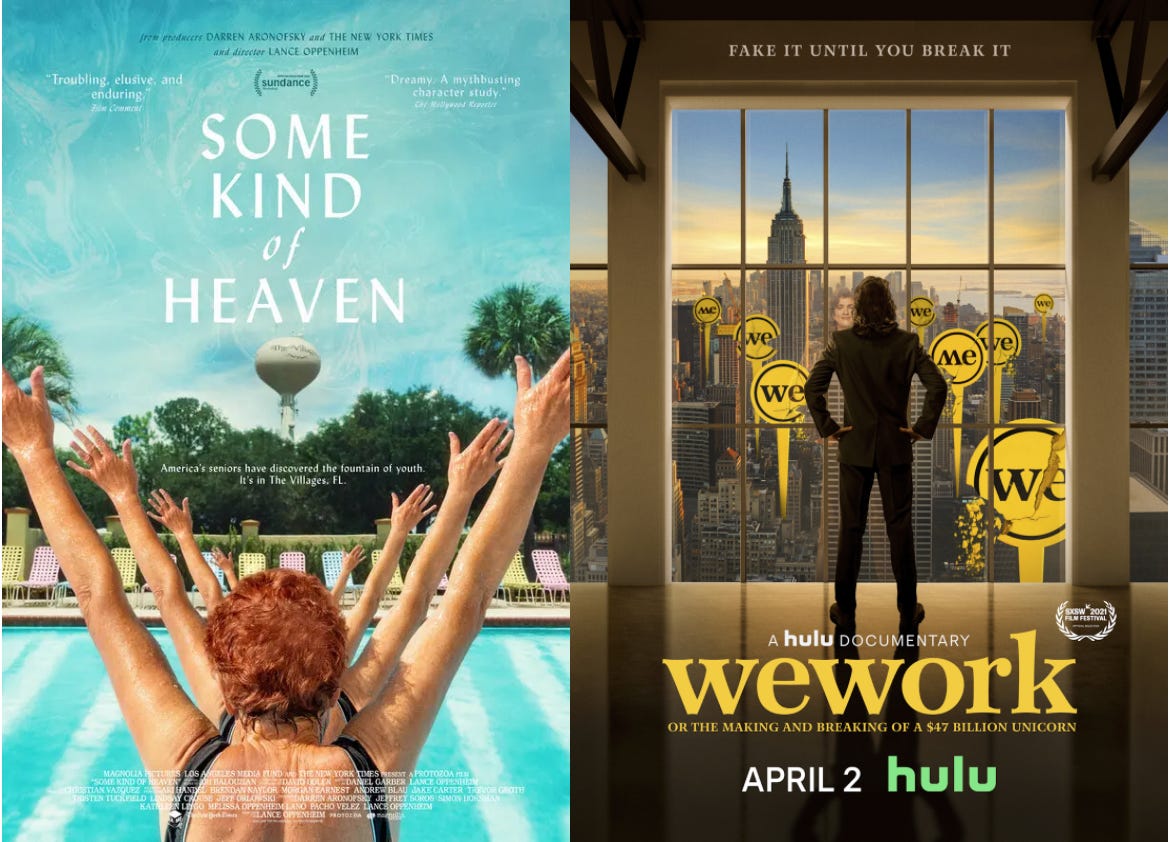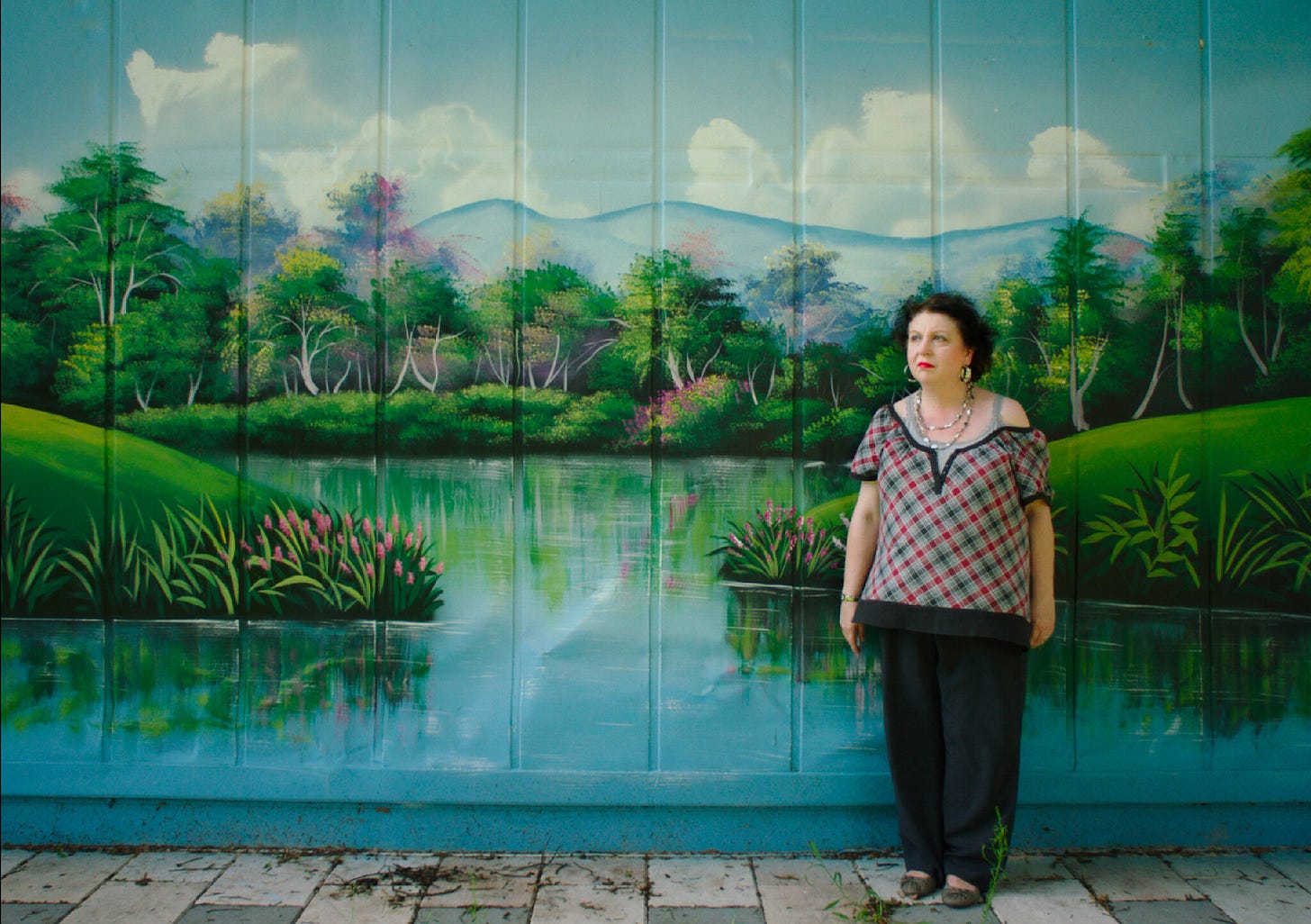We’re excited to share our first edition of Evolver written by a guest contributor. 🎉
Today’s edition is by Randy Tarnowski. Randy, a researcher specializing in the college-to-career pipeline based in Sacramento, CA, carefully follows trends on the future of work. We’ve had some great conversations with him, and we think you’ll find his insights valuable.
“You understand that we’re about to change the way people work, the way people live, but more importantly, change the world.” Adam Neumann, WeWork: Or The Making and Breaking of a $47 Billion Unicorn (2021)
“What strikes me is people move [to the Villages] with the intention of having a happy, healthy life. They’ve been workaholics to keep from thinking about their problems in life. They’re in a box with their time. Most people are like that.”Reggie, Some Kind of Heaven (2020).
Over the past few weeks, I’ve found myself in the lucky position of having some time off as I transition jobs. Armed with free time and distance from work, I’ve gone deep into a backlog of books, movies, and of course, quality Substacks on the future of work. In particular, I was struck by a pair of documentaries that forced me to think about two very different generations (millennials and baby boomers) and their surprisingly similar responses to work and retirement.
On its face, the subjects of WeWork: Or The Making and Breaking of a $47 Billion Unicorn (2021) and Some Kind of Heaven (2020) could not be more different: the former charts the rise and fall of a $47 billion startup led by a charismatic millennial founder, while the latter follows three sets of 70+-year-old retirees living in The Villages, a retirement community in central Florida.
Despite the apparent dissimilarity, I’d argue that the subjects of both films’ would agree on a lot, especially when it comes to the topics discussed in the virtual pages of Evolver:
The way we've treated work hasn't worked: the baby boomers in Some Kind of Heaven, after life-long careers, struggle to find purpose and stability in their golden years. In seeking meaningful community in work, Millennials fuel the rocketship that launches WeWork into its $47 billion valuation.
Change is possible by joining something bigger than myself: both The Villages and WeWork are seen as not simply new ways of living and working but as wildly successful movements set to change the world.
“You Only Live Once,” so make it count: the YOLO lifestyle of both groups is illustrated in places like WeWork’s “Summer Camp,” an annual employee retreat involving inspirational speeches, dodgeball tournaments, and plenty of booze, which bears a surprising similarity to the all-day leisure programming and after-dark line dancing at The Villages.
By the end of both films, visions of the future are presented and prove themselves too good to be true. Billions are lost. Marriages collapse. Court dates are set (I'll let you guess which outcomes belong to which film). At a time when WeWork is preparing to go public again (as a company “ideally situated to serve the future of work”), and The Villages continues to be a politically influential force in a key battleground state, it’s worth considering what the subjects of these two documentaries (millennials and baby boomers) can teach us about the future of work.
WeWork: Or The Making and Breaking of a $47 Billion Unicorn (2021) walks us through how founder Adam Neumann turned “one of the most boring business models in the world” - leasing office space - into something worth $47 billion, along the way creating the modern experience of co-working.
Evolver has already covered the brief history of the modern office, which helps underscore what is so impressive about Neumann’s pitch: his unique ability to transform negative associations with workspaces into something “powered by the spirit of We.” This spirit, Neumann argues, is central to the way we live (WeLive™) and the way we grow (WeGrow™). It’s something that struck a chord with the company’s largely 20-something clientele and the waves of tech investors fawning over the Next Big Thing.
However, once money is on the table and promises grow to global proportions, things start to collapse. As it turns out, platitudes about “we rather than me” and “do what you love” don’t translate to profitability. Concepts like “Community-Adjusted EBITA” (a term invented by WeWork in a doomed attempt to show profitability) tumble under their weight. Such ideas cannot justify a valuation that is orders of magnitude more than the spaces that the company is leasing out. As NYU Business Professor Scott Galloway notes after reading WeWork’s disastrous S-1 filing, “for god’s sake, they’re renting fucking desks.”
By contrast, Some Kind of Heaven (2020) is an intimate portrait of three sets of retirees living in the 80,000+ Florida retirement community dubbed The Villages. While the WeWork documentary adds another entry to the growing charismatic-millennial-dupes-large-swaths-of-their peers documentary genre (see: the dueling Billy McFarland FyreFest documentaries and The Inventor: Out For Blood on Elizabeth Holmes and Theranos) - there is no other way to describe Some Kind of Heaven other than a Baby Boomer insta-filtered fever dream. The film’s stories are interspersed with 65+ retirees zooming around on golf carts, salsa dancing, or getting down to an unsettling bar cover of Blurred Lines. For as much as pieces credit millennials with creating the “YOLO economy,” Some Kind of Heaven makes that case that it’s the over 65+ crowd that is truly throwing caution to the wind, shouting out YOLO as they chug their third Jimmy Buffet-themed margarita before riding off into the sunset via a golf cart caravan.
Like WeWork, Some Kind of Heaven quickly removes the sheen that drew so many retirees to The Villages. While branded a perpetual vacation where you can return to “the way things used to be,” two out of the three subjects are financially unstable, reflecting a national trend of senior food and housing insecurity that COVID-19 has only exacerbated. Barbara, widowed shortly after using her life savings to make the move to The Villages, takes a job at a nursing center, where she acknowledges she will likely have to continue working until she dies. “I’m just saying for me, it hasn’t been the fantasy land I thought it’d be,” she admits. The baby boomer generation has a reputation for reaping all of the benefits of retirement, higher education, and homeownership. Yet the film paints a bleak picture of how, even for the richest generation in the history of the U.S., dedicating your entire life to work doesn’t guarantee happiness or stability into your golden years.
Meanwhile, perpetual bachelor Dennis lives in his van, running from a DUI in California and looking to lock down a wealthy retiree in The Villages. “There has to be more than just surviving,” a younger preacher lectures him, urging him to find a partner after he’s finally been kicked off of the grounds of The Villages. Late in the film, reflecting on whether to settle down into the bliss of retirement or take to the road again, he asks the camera: "Comfort or freedom? That's the way it works; you can't have it both ways".
Watched together, both films are striking in how they center the human stories that drive a desire for a new, different kind of living and working. The millennials and baby boomers presented here, their apparent differences aside, are both interrogating their relationship with work. They seek out communities of like-minded individuals who also understand that, well, we only live once, so we might as well make the most of it.
When we talk about the “future of work,” it's often as an inevitability, a groundswell of social and economic forces that are reshaping society and transforming how we structure our lives. However, the promise of these changes also taps into a lot of what's always been there: hucksters or visionaries (depending on who you ask) who can sell a vision for the future. And dreamers who, after the smoke clears, ask if they got what they were promised.
Thanks again to Randy for contributing today! Please give him a follow on Twitter @randytarnowski. Subscribe to Evolver for more insights and analysis:
Are you interested in writing with us? We take new pitches every month. Send us an email at evolverteam@protonmail.com, and we’ll be in touch.
One-click: Did you enjoy this edition of Evolver?






